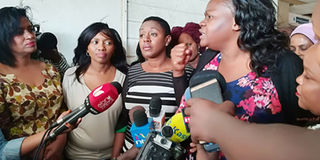Sexual abuse victims suffer double trauma seeking justice

Women MPs at Kenyatta National Hospital on January 20, 2018 when they visited new mothers over rape allegations that were highlighted on Facebook on January 19, 2018. PHOTO | BERNADINE MUTANU | NATION MEDIA GROUP
What you need to know:
- It is hard to believe that the hospital, where thousands of women go every year to give birth or seek medical treatment, can turn out to be the source of harm and injury.
- There was also the case a few years ago of a fake gynaecologist, who was accused of raping his patients after sedating them.
- In the United States, a doctor has just been jailed for life for sexually molesting young female athletes in the American gymnastics team.
Reports of the alleged rape of some breast-feeding mothers at the Kenyatta National Hospital and the clumsy denials by its spin doctors have highlighted the casual and callous way in which Kenyans treat the issue of sexual assault and rape, especially of women.
It is hard to believe that the hospital, where thousands of women go every year to give birth or seek medical treatment, can turn out to be the source of harm and injury.
It is even harder to digest that instead of listening to those who might have been abused by some of the men working in the hospital, the KNH’s management’s immediate response was a denial.
But then, this is hardly surprising in a world where women are generally viewed as lesser beings, and where the rape or sexual abuse of women and girls is often viewed as a male right.
Abuse of female patients is hardly a new phenomenon in Kenya and around the world. Some years back, a report claimed that nurses at Pumwani Hospital, also in Nairobi, regularly beat up women who were in labour.
FAKE GYNAECOLOGIST
There was also the case a few years ago of a fake gynaecologist, who was accused of raping his patients after sedating them.
In the United States, a doctor has just been jailed for life for sexually molesting young female athletes in the American gymnastics team. It is sad that women and girls are being abused in this way by people in the medical profession, and when they are most vulnerable.
In India, there was a furore recently over revelations that doctors examining rape victims routinely used the “two-digit” finger method to determine whether the victim was a virgin before the rape. Apparently, if the doctor’s fingers slipped effortlessly into the victim’s vagina, she was declared a non-virgin. (This method was also used on women who had given birth to several children!).
Investigations revealed that when the victim was declared to have had prior sexual relations, her case against her rapist was severely diminished, with the result that many got away scot-free. In the Indian mindset, a woman who has had sex is not as traumatised by rape as is a virgin.
SUICIDE
Yet, of all the crimes committed against women, rape is rated by women themselves as the one they fear the most. Not only is it physically and psychologically traumatising, it also is stigmatising. There have been reports in India of women committing suicide after being raped.
Women who have the courage to report the crime and seek justice are often not believed – even by their own families – and, therefore, suffer double trauma.
There is also the tendency to view the victim as someone who “asked for it” by the way she was dressed or how she conducted herself. (Is this why a television cameraman, while filming a woman who claimed she was almost raped at the KNH, focused his camera almost exclusively on her hips and breasts?)
The #MeToo movement fuelled by revelations of sexual abuse in Hollywood has prompted more women to come out and expose their attackers. However, this movement has yet to reach the United Nations, where sexual and other types of abuse go largely unpunished because the UN is more keen to protect the perpetrators and its own reputation than to seek justice for the victims.
SEXUAL ABUSE
According to an article published in Euronews, there were as many as 31 reported cases of sexual abuse or harassment at the UN, nearly half of which involved its refugee agency, the UNHCR.
UN peacekeepers are also notorious for the sexual abuse, including the rape, of women, girls and boys in various war-torn countries. Few of these cases come to light, and even when they do, there is no punishment meted out to the abusers.
In most cases, women who report sexual harassment or abuse face the threat of being fired. Young female consultants on short-term contracts are particularly vulnerable.
Investigation
A recent investigation by the Guardian newspaper found that the UN “has allowed sexual harassment and abuse to flourish in its offices around the world, with accusers ignored and perpetrators free to act with impunity”.
The UN’s internal justice system is also heavily skewed in favour of the perpetrators. It seems that when it comes to reporting abuse and obtaining justice, the women working for the UN are on their own.





